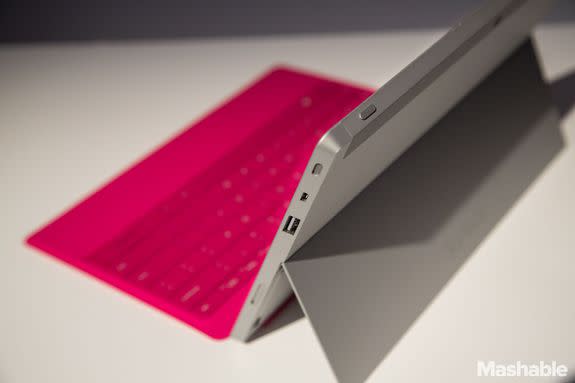The Microsoft 'CloudBook' could be Chromebooks' worst nightmare

Over the past couple of years, Microsoft has made a real name for itself in the high end. The Surface Pro and Surface Book are powerful-yet-portable PCs that have found real momentum in the market. And last fall the company made a convincing play for creators with its impressive—and expensive—Surface Studio all-in-one PC.
Now Microsoft appears to aiming at the other end of the market. It's rumored that the company will be debuting a new kind of PC at its education-focused event on May 2: an inexpensive computer designed to primarily run apps from the cloud, a device that will finally directly respond the rapid rise of Chromebooks.
SEE ALSO: Back from the sea, Joe Belfiore is ready to help Microsoft win
It's called a CloudBook, according to reports, and it'll run a new variant of Windows 10 called Windows Cloud. The main thing separating Windows Cloud from regular Windows? Machines running it will only be able to run apps downloaded from the Windows Store.
If this is starting to sound familiar, you're not crazy. That restriction is very similar to what separated the old Surface tablets, the Surface RT and Surface 2, from regular Windows machines. But that was because they ran Windows RT, the now-defunct version of Windows designed for ARM-based devices (as opposed to Intel/AMD x86 machines). Today, Windows RT is long dead, and older, Win32-based apps are even available in the Windows Store.

Image: Christina Ascani/Mashable
All that said, two qualifiers: Although Windows RT is gone, Windows 10 can still run on ARM devices—all Windows mobile phones have ARM chips and run it. So, theoretically, Microsoft could debut a Windows PC with an ARM chip whenever it wants. And that brings us to the second qualifier: Even though the Windows Store now offers some Win32 apps, that doesn't necessarily mean the CouldBook will run them.
At least one report says it will run Win32 apps, though, so a more likely scenario is this: The CloudBook will indeed have an Intel chip, but Windows Cloud will have a setting where you can restrict apps to Windows Store only, which will be the default. After all, if the whole idea is to take on Chromebooks, the OS will need to offer robust management tools.
interesting, a collection in WinStore for "students and scholars", id is "cloudbook" ms-windows-store://collection/?collectionid=cloudbook pic.twitter.com/JE2th3T1yh
— WalkingCat (@h0x0d) April 13, 2017
A build of Windows Cloud appears to have leaked out back in February, and those who tried it out say it's essentially Windows 10 with some modified settings and warnings to steer the user toward lighter, cloud-based apps. That should be a relief to users, though it may not bode well for cost. If these machines need a full, or close to full Windows license, they might end up being a notch more expensive than Chromebooks, which start at about $200.
Windows once tried going down the route of cheap machines barely worthy of the label "PC," and the world rejected the result: the netbook. Times have changed, though: The cloud is now king, and Chromebooks have proven the viability of the model, which will go a long way toward convincing OEMs to get on board. In 2017, it should be possible to create a cheap Windows machine that performs well at a few cloud-based tasks (browsing, email and Office apps, mainly).
The main challenge Microsoft will have with such a machine would be managing expectations. People tend to expect a certain amount of versatility from any PC under the Windows umbrella. Even if Windows Cloud and the CloudBook give Chromebooks a run for their money, it could face an even tougher comparison: Windows 10 itself.

 Yahoo Finance
Yahoo Finance 